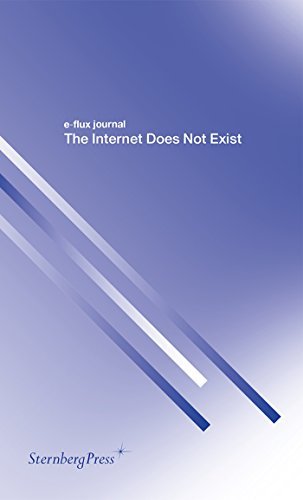This collection of essays is stunning in its range. It is the best explanation I've come across yet of the internet age. Its perspective is the intersection of art, technology and politics. In the past an individual's grip on the world was self and society, soul and God; now we perceive things strictly through networks. If you have something to say about self, society, soul or God you will find your niche; more than likely, the global network will have its say more than you or your niche will. Do you have art or criticism or politics you would like to share with the world? Fight the power first!
Collectively speaking, the tone of the essays is theoretical-polemical, and the center of its gravity, which for me is one of the book's greatest features for not being Anglophilia, is probably Germany, central and northern Europe. The writers are active in their fields of visual arts, filmmaking, museum curating, design. They are all way beyond the question of whether the internet is good or bad for you. The same goes for Marxism, media studies, science, postmodernism, globalism, liberal cosmopolitanism. It seems, for the most part, leftist in origin, but there is a real debate going on here about whether such off-shore tactics as encryption are truly democratic (a la Sanders v. Clinton). What you won't get is ways to look after the poor and oppressed, how governments ought to monitor and provide real-life, tangible services. Networks could just be an illusion of community but then again the same has been said for literature ever since it was aware it had a name and a purpose. Networks are in the street. We feel it walking through architecture. It is what is causing us to feel distracted and distressed when reading novels that miss the point. Want to know what that's about? Answers are provided.
The excerpt on the back cover that sold it for me at the tables of MIT Press in Cambridge:
"The internet does not exist. Maybe it did exist only a short time ago, but now it only remains as a blur, a cloud, a friend, a deadline, a redirect, or a 404. If it ever existed, we couldn't see it. Because it has no shape. It has no face, just this name that describes everything and nothing at the same time. Yet we are still trying to climb onboard, to get inside, to be part of the network, to get in on the language game, to show up on searches, to appear to exist. But we will never get inside of something that isn't there. All this time we've been bemoaning the death of any critical outside position, we should have taken a good look at information networks. Just try to get in. You can't. Networks are all edges, as Bruno Latour points out. We thought there were windows but actually they're mirrors. And in the meantime we are being faced with more and more - not just information, but the world itself."

